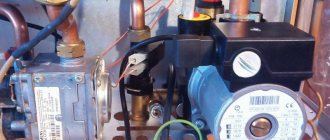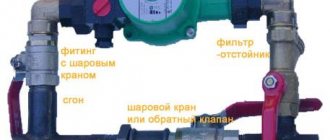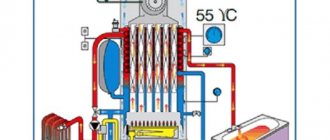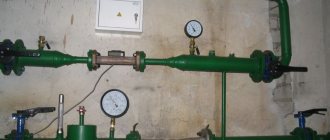Main causes of noise and solutions
In search of why a gas boiler makes a lot of noise when heating, you need to pay attention to the pressure in the system, the performance of the fan, the composition of the water and the presence of scale on the thermoelements.
Fan fault
The purpose of the purge device is to remove combustion products; it cleans the system of residual smoke and gas. Often the problem is caused by fan wear due to prolonged use. An even stronger buzz can be caused by the following phenomena:
- the unit is clogged with dust, the consequences of gas processing;
- since the fan is placed above the burner, as a result of constant contact with high temperatures, the bearing grease is burned out, which causes increased friction of the components;
- manufacturing defects.
The characteristic sound for this breakdown is periodic clicking. In this case, boiler repair comes down to several manipulations:
- The first step is to inspect the fan; it must be thoroughly cleaned from the inside. The working blades are placed on the inside of the casing, accumulated dirt and dust are removed from them, and the lubricant on the bearings is refreshed;
- if the unpleasant sounds do not stop, you can install a new rubber gasket or ball valves;
- If the above measures have no effect, it is recommended to reinstall the cooler.
It is better to entrust the last procedure to a professional.
Oversaturation of water with oxygen
Breakdowns are often caused by air pockets that appear due to too small a volume of coolant in the system. Air prevents stable circulation of water, which leads to disruption of the heat exchange process. There is not enough liquid, the boiler walls overheat, and the unit begins to make noise.
Airing is the basis of two problems:
- coolant circulation decreases or completely stops;
- the intensity of heat transfer from nodes and sections of the circuit decreases significantly.
Under what conditions does air enter the system:
- depressurization of equipment and pipelines during repair of risers;
- violation of the integrity of the ligaments;
- preventive manipulations, for example, replacing risers, working elements, locking mechanisms;
- complete removal of water from the system;
- repair of individual units as part of summer preventive inspections.
A gas boiler may hum due to air in the system.
The airing effect is a clear signal of incorrect functioning of the boiler. When there is too little water in certain sections of the pipeline, an air lock forms. Individual zones of the mechanism cool down, the coolant loses its ability to circulate fully, and loud howls and whistles appear in clogged areas.
To properly configure the unit, you need to adjust the thermostat - this step will help eliminate the reason why the heating boiler is noisy, if it is not due to incorrect installation of this component. If the thermostat is OK, you need to adjust the water supply or add it manually. Many models provide a lever for these cases.
To remove air, you can use:
- Mayevsky crane. Warm air most often accumulates in the upper zones of the radiator, and a compact unit is installed there - it is located at the end. When the fitting is unscrewed, the gas is released;
- an air separator is a special device that collects dissolved oxygen and turns it into bubbles.
After the pipes are freed from gas, water is poured into them and the operation of the heating system is checked.
Reduced pressure
This phenomenon may be caused by the following circumstances:
- there is a water leak in the system;
- malfunction of the expansion tank operating in tandem with the boiler;
- when choosing a boiler, potential loads were not taken into account;
- long power outages;
- the boiler is installed or configured incorrectly.
A gas boiler may hum due to reduced pressure.
Low pressure in the device is manifested by loud sounds when heating, so first of all you need to make sure there are no leaks. To do this, wipe all joint areas with a napkin; if their integrity is violated and pressure increases, drops of water appear here. The discovered areas must be patched.
Sediment on gas boiler elements
The heat exchanger serves as a link between the heating gas boiler and the working fluid, the latter is heated by it. The specific composition of water can cause scale formation; lime accumulates in the internal cavities of all elements of the heating system.
This effect provokes a narrowing of the passage for the coolant, small bubbles and steam are formed. Due to scale, the efficiency of devices and their resistance to wear are reduced. In such conditions, loud sounds appear within 15-20 minutes after turning on the boiler - the device makes whistles and hisses, and howls like a boiling kettle. The walls of the heat exchanger will overheat, which can lead to warping.
Sediment on the elements of a gas boiler can cause the gas boiler to hum
To clean the unit from unwanted deposits, you need to rinse all components of the system and the heat exchanger with a chemical solution. If you have any doubts when choosing a specific composition, you should consult a gas service employee. First you need to remove the heat exchanger itself, then you should disassemble the casing and disconnect the pipes connected to it. Chemical reagents are poured into the apparatus and left for 2-5 hours.
Why does the boiler hum when hot water is turned on?
Gas boiler repair specialists note that the occurrence of noise when heating water can be influenced by indirect or more serious reasons.
It is important to keep the boiler clean. Photo source: willow-bag.ru
First, you need to study not the most serious breakdowns that will not be difficult to fix on your own.
Why is the gas boiler humming?
- Serious errors were made during installation or assembly of equipment. To fix the problem, you need to check all parts and connections. If you have no experience in plumbing, then it is advisable to call a specialist who did the installation. He will correct his shortcomings.
- A gas boiler, like any other equipment, must be correctly configured to operate under specific conditions. If the owner of the equipment made mistakes, then loud noises may appear when heating the water. The only way to fix the problem is to carefully read the instructions and re-make the necessary settings.
- The boiler may begin to hum due to old age. If the equipment was purchased many years ago, then some components are probably out of order. In this case, only replacement with new equipment will help.
These problems are rather vague. If the boiler starts to hum, then first you can check these three points, perhaps one of them will help fix the problem. Such operations can be carried out in a fairly short period of time. But if a gas heating boiler makes a lot of noise when heating water, then it is necessary to look for clearer and more serious reasons.
3 main reasons
Boiler noise when heating water:
- One of the main reasons why a boiler hums when heating a liquid is the high concentration of oxygen in the water that passes through the pipes of the device. Because of this, when heated, a large number of bubbles can form in it. This effect produces not only a strong hum, but also noticeable vibrations. A clear sign of increased oxygen concentration is the hum of the gas boiler and the vibration of the batteries connected to it.
- A large amount of air has accumulated in the installed system. If you hear strong puffing and even knocking noises when heating the water, then it is necessary to remove the air from the pipes. Modern boilers are equipped with special taps; they must be opened to release air and eliminate the problem.
- Another common problem that causes a loud humming sound when heating water is the accumulation of salts that are deposited in the heat exchanger. To fix the problem, you will need to open the gas boiler. If its walls are covered with salts, then you were able to find the cause of the buzzing. Due to the accumulation of salts, the equipment begins to work very loudly when heating the water. Thorough cleaning and rinsing of the heat exchanger walls is necessary. It is important to note that thermal output and heating dynamics may also be affected. Initially, the hum will come from the heat exchanger, which is located in the gas boiler.
To avoid difficulties, it is necessary to check and, if necessary, clean the radiator at least once a year. For these purposes, it is advisable to purchase a pump from a specialized store (otherwise the heat exchanger will not have enough water for cleaning), which has a reagent. The cleaning liquid will be supplied to the gas equipment through hoses.
Fan failure
The fan is quite easy to dismantle.
The fan is usually connected to a special compartment through which combustion products are eliminated. If the fan becomes clogged, the boiler starts to operate very noisily. You can even hear a whistle.
There are several reasons for fan failure:
- First you need to check the condition of the bearings. They should be located directly above the burner. It is possible that the lubricant that should be poured inside has evaporated or leaked. In this case, it is necessary to disassemble the device and lubricate the parts. It is important to read the instructions before doing this and find out which lubricant is suitable for the equipment model you are using.
- If the problem is not resolved by replacing the lubricant, you will have to check the balancing of the blades. Since a large amount of combustion products exits through the pipes, a large amount of dirt can stick to the blades. As a result, when rotating, they will begin to work very loudly and create an unpleasant hum. To restore the fan's performance, it is necessary to thoroughly clean the blades, and then correctly adjust their rotation through balancing.
Excessive pressure in the heating pump
If none of the above methods helps fix the problem, you need to check the pump in the boiler, which can make a lot of noise when the pressure in the system changes. In this situation, you will have to configure it again. If too much pressure builds up in the pump, the first sign of this is the appearance of a humming sound.
It is not difficult to replace a broken pump
In the future, this can lead to an emergency situation that is dangerous to human life. To change the equipment settings, you need to move the white lever on the box where the terminals are located to a different position. As a rule, the problem disappears.
Checking settings
The correct setting is necessary for the boiler to operate without extraneous noise when heating water. If the device overheats greatly, this can lead to the problem in question.
The main reason is the lack of water in the network. In this case, you will need to study the operation of the thermostat and its parameters. Perhaps its settings have gone wrong. You will have to set more appropriate parameters yourself. It is also advisable to measure the pressure inside the system. If there is a need for this, add a coolant inside the device.
You can also regulate the gas valve or bypass on a gas boiler, which is also called a jumper. If a humming noise starts when the water heats up, then these parts need to be adjusted.
Popping sounds appeared
If clicking or popping noises are observed during startup, you need to check the following parts:
- Three-way valve. This is a switch from hot water to heating. If clicks are observed during operation, the valve must be replaced.
- The spark takes a long time to fire. If the burner is unstable, a spark may not appear immediately. This will cause a gas build-up to form. As soon as ignition occurs, it will flare up and you can hear popping sounds. To fix the problem, you will need to check the burner and igniter, as well as all contacts.
- The chimney or filter is clogged with dirt. The solution is thorough cleaning. The chimney is checked with a lit match. It must be brought close to the ventilation; if the flame sways, then the system is working properly.
By checking these parts, replacing them or cleaning them, the boiler will stop making clicking noises every time it ignites.
Conclusion
A gas boiler is a necessary thing in a private home. Therefore, when purchasing, it is necessary to carefully study the instructions for it in order to find out about the existing parts of the device that may have to be repaired. If you properly care for and timely adjust the equipment and clean certain parts, then you can reduce the likelihood of extraneous noise appearing in the boiler when heating water. The device will operate normally.
Other Possible Causes
Another phenomenon that worries owners of gas equipment is the clicking and popping noises that occur during ignition. Failures are possible in the following components:
- in a three-way valve. It serves as a switch between domestic hot water and heating; when a malfunction occurs, it clicks. The solution to the problem is to install a new one;
- in the ignition unit. A loud bang accompanying the long appearance of a spark indicates the accumulation of gas, which subsequently flares up. It is necessary to carry out diagnostics - inspect the burner, electrodes, igniter, contacts.
If a blockage has formed in the wick or chimney, the boiler will bang when ignited, which often happens with semi-automatic models.
Clogged injectors are indicated by noise during heating, while it is extremely difficult to ensure ignition, and a fragmentary flame occurs. Here you need to stop the gas supply and clean the holes with a thin wire.
A clogged wick is recognizable upon inspection and is easy to clean. In the case of a chimney shaft, you need to make sure that there is draft: bring a match flame to the ventilation or control window; if the fire is steady, you will have to remove the blockage. In units with automatic ignition, the electrode often gets clogged.
If the installation was carried out incorrectly, the clanging of metallic impacts may occur if the housing is hung incorrectly. When heated and cooled, the metal changes its geometric parameters; expansion and contraction are accompanied by loud sounds.
The same processes are characteristic of pipes walled into walls, so when installing them it is important to leave an expansion gap.
If the heat exchanger plates are clogged, the boiler also begins to make loud noise when heating, the reason being clogging with soot, dust, and soot. You need to remove the housing and clean all components of the heat exchanger with a special pump or a metal brush. Dust could have clogged up in the mesh, which is visible in the lower part of the body, which causes a decrease in thrust in models with an open combustion chamber.
Resonance due to uneven operation of the circulation pump can also manifest itself in the form of noise. In this case, it is enough to adjust the pump settings.
Prevention measures
If the boiler hums when starting up or turning on hot water, you must first make sure that there is a sufficient level of liquid in the system and, if necessary, top it up. If sounds are coming from radiators and pipelines, it means that air pockets have formed in them, which should be removed. If the pump knocks or whistles, it is most likely a manufacturing defect: you will have to install a new working unit.
An effective preventive measure is timely removal of scale from the heat exchanger. It is also important to monitor the gas supply so that the pressure does not build up too high.
Why is it important to fix the problem immediately?
Even small pops are warning beacons indicating that the equipment is faulty. If the problem is not solved immediately, it will get worse in the future. The boiler may turn off, in addition to popping noises, an open flame comes out of the boiler, etc.
Despite the fact that modern equipment is equipped with good protection systems, the owner must still use it competently, maintain it in a timely manner, remove blockages, etc. Then the boiler or column will work for a long time, efficiently and without failures.
If you find that the boiler slams when turned on or makes noise during operation, and the reason cannot be determined, contact the experts. They will advise you on this issue, and if necessary, they themselves will diagnose and eliminate the cause of incorrect operation. Call.
The autonomous gas heating system from the Korean manufacturer Navien is quite popular among consumers; it is installed both in country houses and apartments.
Navien units have gained popularity due to their good technical characteristics, ease of operation and installation. Like all appliances for domestic use, the Navien gas heating system has its own faults.
Of course, the manufacturer provides a guarantee for its device and claims that the likelihood of breakdowns is almost zero, given the high quality of the equipment. But if this happens, then with a competent and timely approach they can be quickly eliminated.









